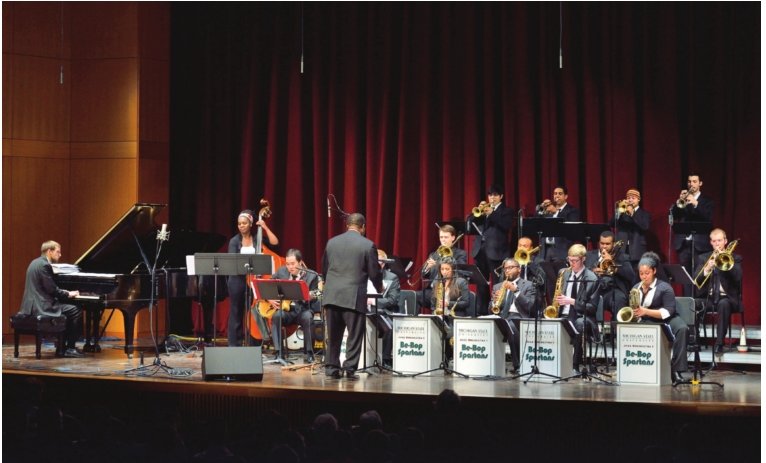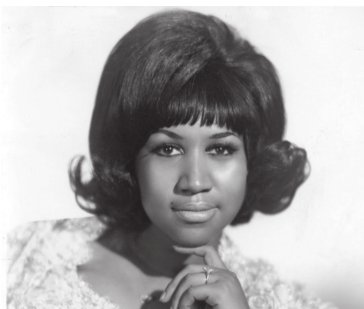MLK tribute concert honors Aretha Franklin

MSU’s eagerly awaited annual Martin Luther King tribute concert is always about respect.
This year, that goes in all caps: “R-E-S- P-E-C-T.”
The death in August of American icon Aretha Franklin left no doubt what this year’s theme would be.
From church pulpits to kitchen radios to the Presidential inaugural platform, Franklin’s life and work melded the civil rights movement with the most beloved American music, from gospel to jazz to pop. At every level of life.
In 1967, Franklin’s cover of Otis Redding’s “Respect” shot to No. 1 and became the unofficial anthem of the civil rights and feminist movements.
“Aretha was an empowered woman,” Jazz Studies director Rodney Whitaker said. “She came out of an abusive relationship early in life, emerged as a superstar, handled her own business and was a pioneering role model in the music industry.”
The sheer magnitude of Franklin’s legacy didn’t make it easy for students and faculty from the MSU College of Music to keep it down to a couple of hours.
Even the resounding voice of classical baritone Jadrian Tarver, a doctoral student at MSU, with a full jazz orchestra backing him up, performing the iconic spiritual “Amazing Grace,” will only plumb a portion of Franklin’s legacy.
“She was a part of my life since I was little,” Tarver said. “Her gospel songs, her soul songs — there are so many that are part of me, of all of us.”
Tarver grew up in Florida, steeped in the black church. His mother and aunt grew up listening to Franklin’s seminal gospel album with the Rev. James Cleveland.
His grandmother listened to Sunday broadcasts by Franklin’s father, the Rev. C.L. Franklin, a civil rights leader and supporter of Dr. King, with a young Aretha Franklin singing gospel music.
In the mid-1960s, Aretha Franklin traveled the country with King on a voting rights campaign, an experience she later said “forever changed” her life.
On a February 1968 visit to Detroit, King surprised Aretha Franklin with a special award from the Southern Christian Leadership Conference as the mayor declared “Aretha Franklin Day.”
It was the last time they saw each other. In April 1968, five days after King was shot, Franklin sang “Precious Lord, Take My Hand” to mourners at Ebenezer Baptist Church in Atlanta. Nearly 40 years later, Franklin sang “America” at Barack Obama’s inauguration in 2009.
Whitaker played with Franklin several times, usually in informal settings such as Franklin’s house parties.
MSU Jazz Orchesta with Rodney Whitaker.
“She could put her vibe, her way of hearing, on anything,” Whitaker said.
Franklin was also fan of trumpeter Roy Hargrove’s great quartet, with Whitaker on bass, and sat in with the group on occasion.
“The few times I played with her, she got up and sang standards like ‘Try a Little Tenderness,’ but it was still soulful, it was Aretha Franklin,” Whitaker said. “It was like being in a black church. She brought it.”
Tarver said Franklin’s legacy is “unparalleled.”
“She gave to her country, and to her people, unapologetically, because she loved us and loved people to be free,” he said. “You can hear it in ‘Respect’ and see it in her giving.”
To curate the Franklin tribute, Whitaker called upon Color Me Music, a new group of College of Music students seeking to promote and perform music by people of color.
Two members of the group, Tarver and jazz studies senior Jordyn Davis, combed through Franklin’s catalog and picked the greatest of the greatest, including “Think,” “Respect” and “Natural Woman.”
“Amazing Grace” marks the first time Tarver will perform with jazz students.
“It’s two worlds coming together, but that’s in the spirit of Aretha Franklin,” Tarver said.
The jazz and vocal forces will also perform “What a Friend We Have in Jesus” and other songs from Franklin’s gospel record with Cleveland, along with pop tunes she put an indelible stamp on, “I Say a Little Prayer” and “Bridge Over Troubled Water.”
Whitaker also invited special guest Kenny Washington, a masterful Bay Area tenor who frequently sings with the Lincoln Center Jazz Orchestra, to lift his sinuous, soulful voice at Sunday’s tribute.
The tribute will also feature spoken word performances honoring King and — MSU being MSU — plenty of hard-swinging, straight-up jazz, including Etienne Charles’ modern reworking of “We Shall Overcome,” Oliver Nelson’s arrangement of “Down By the Riverside,” and Dizzy Gillespie’s blazing fast “Things to Come.”
“Dr. King grew up on jazz,” Whitaker said. “Of course, he was a preacher, so he liked Mahalia Jackson, but jazz was the music he dug the most.”
Jazz: Spirituals, Prayer and Protest Jan. 20 3 p.m. and 7 p.m. MSU Auditorium Fairchild Theatre Free but tickets required (517) 353-5340 www.music.msu.edu
Support City Pulse - Donate Today!
Comments
No comments on this item Please log in to comment by clicking here